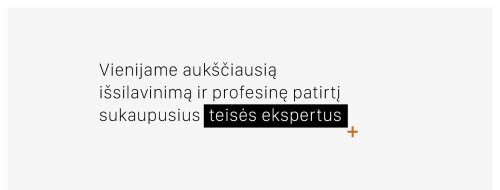Best Drunk Driving Lawyers in Kaunas
Share your needs with us, get contacted by law firms.
Free. Takes 2 min.
List of the best lawyers in Kaunas, Republic of Lithuania
About Drunk Driving Law in Kaunas, Republic of Lithuania
Drunk driving, officially referred to as driving under the influence (DUI), is considered a serious offense in Kaunas and across the Republic of Lithuania. The country enforces strict regulations regarding the allowed blood alcohol concentration (BAC) for drivers. Lithuanian authorities prioritize road safety, and the consequences of breaking drunk driving laws can include severe fines, license suspension, and even jail time in serious cases. Understanding your obligations and possible legal implications is crucial if you are facing drunk driving accusations in Kaunas.
Why You May Need a Lawyer
Seeking legal assistance is highly recommended if you find yourself accused of drunk driving in Kaunas. Common situations that may require the help of a lawyer include:
- Challenging the accuracy or legality of a breathalyzer or field sobriety test.
- Facing charges with complex circumstances, such as repeat offenses or accidents resulting in injury.
- Negotiating plea deals, reduced penalties, or license reinstatement.
- Representing yourself in court if the case goes to trial.
- Understanding your legal rights and obligations under Lithuanian law, especially if you are a foreign national.
A lawyer can explain the process, protect your rights, and help achieve the best possible outcome.
Local Laws Overview
The Lithuanian criminal and administrative codes set the framework for drunk driving offenses in Kaunas. Key aspects include:
- The legal BAC limit is 0.4 permille for most drivers and 0.0 permille for novice drivers (less than 2 years' experience), professional drivers, and drivers of motorcycles, taxis, or large vehicles.
- Exceeding the BAC limit is an administrative violation, but higher BAC levels may result in criminal charges.
- Penalties vary depending on the BAC level, presence of previous offenses, and whether the incident resulted in harm or damage.
- Possible penalties include fines, temporary or permanent driving bans, mandatory driver education, vehicle confiscation, or imprisonment.
- Refusing to submit to a sobriety test is treated as a serious offense, often resulting in penalties as severe as those for high BAC levels.
- The police have the authority to stop drivers for tests and can detain individuals suspected of intoxicated driving.
Due to the serious nature of these offenses, legal representation can be vital for navigating your case effectively.
Frequently Asked Questions
What is the legal blood alcohol limit for drivers in Kaunas?
The standard legal BAC limit is 0.4 permille for most drivers. However, for novice and professional drivers, the limit is 0.0 permille, meaning any presence of alcohol is strictly forbidden.
What happens if I am caught driving over the legal alcohol limit?
You may face a fine, temporary suspension or permanent revocation of your license, community service, or imprisonment depending on the BAC level, repeat offenses, and other circumstances.
Do I have to perform a breathalyzer or blood test if requested by Lithuanian police?
Yes, refusal to comply with sobriety testing is an offense that can result in severe penalties equivalent to or greater than those for being significantly over the legal BAC limit.
Can drunk driving cases lead to criminal prosecution?
Yes, high BAC levels, repeat offenses, or causing accidents, property damage, or injuries while intoxicated can lead to criminal charges.
Will a drunk driving conviction be recorded on my criminal record?
Yes, if the offense is considered criminal under Lithuanian law, it can be listed on your criminal record, potentially affecting future employment or travel.
Can a foreign national be prosecuted for drunk driving in Kaunas?
Yes, local laws apply to all drivers within Lithuania. Foreign nationals may also face deportation or difficulties obtaining future visas.
How can I challenge a drunk driving accusation?
You have the right to contest the charges in court. It is recommended to consult with a qualified lawyer who can assess whether the test procedures followed proper protocols and defend your rights.
How long will my license be suspended if found guilty?
Suspension periods vary based on the BAC level and history of prior offenses, ranging from several months to permanent revocation, especially for repeat offenders or aggravated circumstances.
Are there mandatory programs for drunk driving offenders?
Yes, courts may require attendance at driver improvement classes or alcohol treatment programs as part of sentencing, especially for repeat offenders.
What should I do immediately after being charged with drunk driving?
You should seek immediate legal advice to understand your rights and responsibilities, avoid making statements that could harm your case, and ensure the proper legal process is followed.
Additional Resources
Several organizations and government bodies can provide assistance and information about drunk driving laws in Kaunas:
- Lithuanian Police Department (Lietuvos policija) – for legal procedures and reporting incidents.
- Ministry of Transport and Communications – for driver licensing and regulations.
- Lithuanian Bar Association – to find qualified lawyers specializing in traffic and criminal law.
- Kaunas Municipality Legal Aid Services – for public legal information and referrals.
- Driver training and rehabilitation centers – for mandatory courses or counseling programs.
Next Steps
If you are facing a drunk driving charge in Kaunas, consider the following steps:
- Remain calm and cooperate with law enforcement during the initial incident.
- Request detailed information about your case, including copies of all test results and official statements.
- Avoid making any statements or admissions without a legal representative present.
- Contact a lawyer experienced in Lithuanian traffic and criminal law as soon as possible.
- Follow your lawyer's advice closely and attend all required court dates or administrative hearings.
- Comply with any court orders, including participation in driver education or rehabilitation courses.
Taking prompt action and seeking professional guidance increases your chances of a favorable outcome and helps protect your legal rights throughout the process.
Lawzana helps you find the best lawyers and law firms in Kaunas through a curated and pre-screened list of qualified legal professionals. Our platform offers rankings and detailed profiles of attorneys and law firms, allowing you to compare based on practice areas, including Drunk Driving, experience, and client feedback.
Each profile includes a description of the firm's areas of practice, client reviews, team members and partners, year of establishment, spoken languages, office locations, contact information, social media presence, and any published articles or resources. Most firms on our platform speak English and are experienced in both local and international legal matters.
Get a quote from top-rated law firms in Kaunas, Republic of Lithuania — quickly, securely, and without unnecessary hassle.
Disclaimer:
The information provided on this page is for general informational purposes only and does not constitute legal advice. While we strive to ensure the accuracy and relevance of the content, legal information may change over time, and interpretations of the law can vary. You should always consult with a qualified legal professional for advice specific to your situation.
We disclaim all liability for actions taken or not taken based on the content of this page. If you believe any information is incorrect or outdated, please contact us, and we will review and update it where appropriate.















